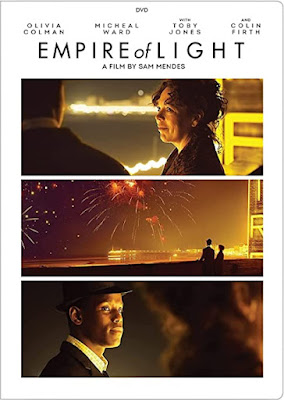Writer-director Sam Mendes has a gift for portraying wounded souls. And actress Olivia Colman has a gift for embodying them. In last year’s Empire of Light, a fading movie theatre in a seaside English town becomes the venue in which a lonely, psychologically damaged woman (Colman) suffers great indignity, lashes out with a vengeance, but finally finds her way.
Movies about movie theatres are almost as familiar today as movies about movies. Back in 1924, the whimsical Sherlock Jr. focused on a projectionist (Buster Keaton) who, pining for a pretty girl, imaginatively willed himself into the movie he was screening, transforming his nebbishy self into a bold detective. In The Last Picture Show (1971),. Peter Bogdanovich uses the shuttering of a local Texas movie house to illustrate the slow death of a small town. But the real classic in this genre is 1988’s Cinema Paradiso, a heartfelt Italian coming-of-age tale about the formative relationship between a young boy and the middle-aged projectionist at a local theatre.
Empire of Light also takes us into the projection booth, as a new employee learns the ropes from a dedicated veteran (Toby Jones). But Colman’s character, Hilary, who functions with great efficiency as the theatre’s manager, rarely watches a film herself.. She may connect emotionally with the theatre building’s long-ago grandeur, and chooses the night of a major local premiere (Chariots of Fire) to strike out against someone who deserves it, but it’s rare for her to sit and be transported by the magic of cinema. It’s only late in the film, when she’s seen the worst of what life can do, that she asks the projectionist to screen a film just for her. Her choice was to me somewhat unexpected: Peter Seller’s melancholy 1979 tour de force, Being There.
Empire of Light is set in the 1980s, and one part of the social world it depicts is the era’s common right-wing hostility to Black immigrants. Though the cinema employees are mostly a welcoming lot, a new young Black hire, Stephen (Micheal Ward), has to face up to vicious skinhead types who would be all too happy to do him physical harm. He’s a young man, the son of a local nurse, who’s betwixt and between: he’d like to go to college to pursue a degree in architecture, but he’s pretty much given up on that expensive dream. Somehow he connects with Colman’s Hilary over a wounded pigeon and the old theatre building’s picturesquely empty upstairs salons. The Hilary/Stephen relationship—part familial, part sexual—gives pleasure to them both. But of course it is doomed not to last. They are simply too different from one another, and too caught up in their own problems to take on someone else’s.
So there’s no happy ending? Well, let’s say that progress is made on all fronts. Friendships survive, and the old theatre (played in the film by an actual historic cinema that’s no longer in service) continues to use beams of light to project moving images onto a screen. It’s magic, in more ways than one.
Sam Mendes segued from acclaimed work on the British stage to an Oscar-winning American movie, the painfully sardonic American Beauty (1999). His subsequent films have included a crime thriller, Road to Perdition, a James Bond classic, Skyfall, and a much- honored World War I epic, 1917. Empire of Light returns him to the role of writer-director of an intimate but powerful small-cast film. Though it doesn’t pack nearly the punch of American Beauty, it’s worth seeing (and admiring) in its own right.








No comments:
Post a Comment